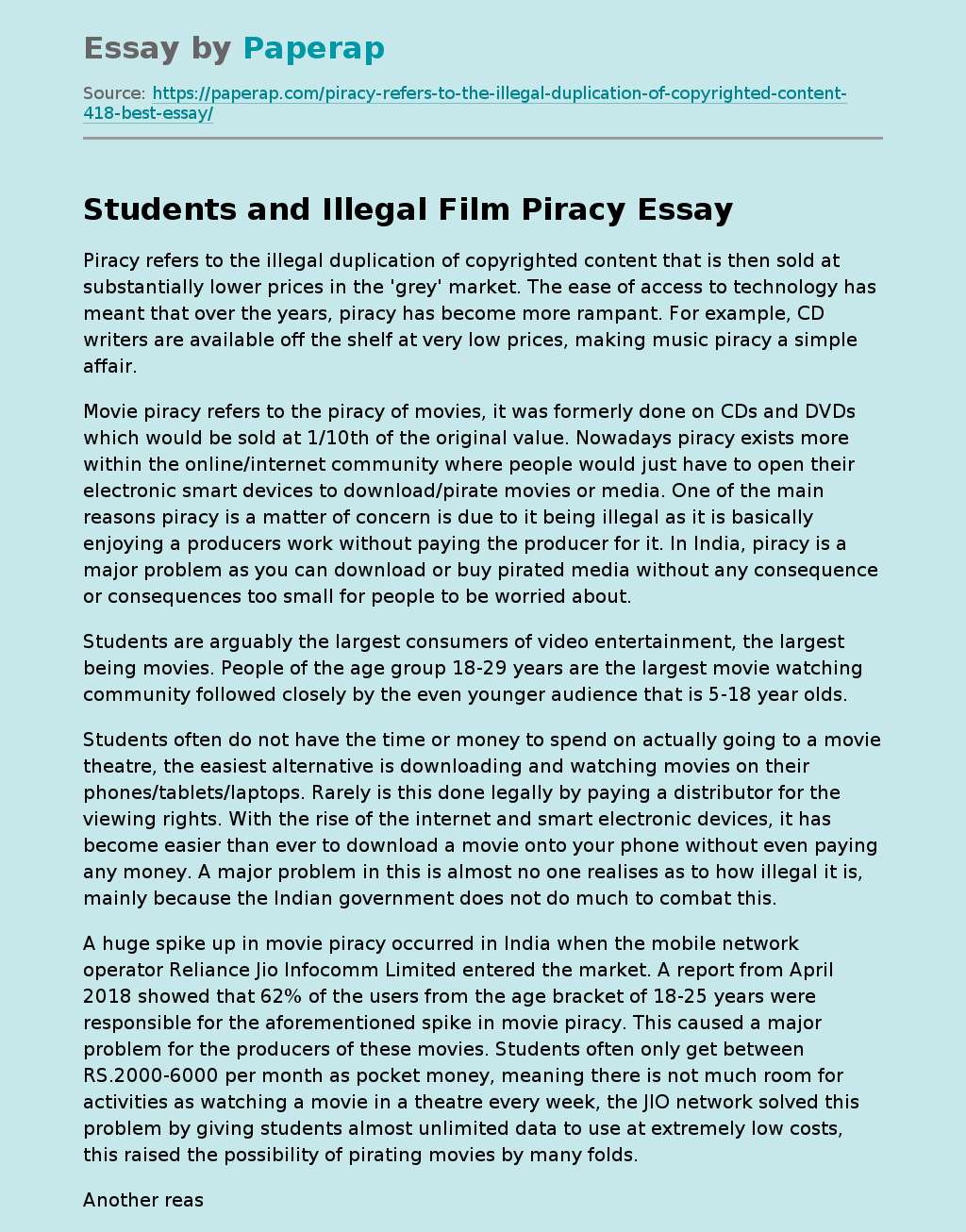Students and Illegal Film Piracy
Piracy refers to the illegal duplication of copyrighted content that is then sold at substantially lower prices in the ‘grey’ market. The ease of access to technology has meant that over the years, piracy has become more rampant. For example, CD writers are available off the shelf at very low prices, making music piracy a simple affair.
Movie piracy refers to the piracy of movies, it was formerly done on CDs and DVDs which would be sold at 1/10th of the original value.
Nowadays piracy exists more within the online/internet community where people would just have to open their electronic smart devices to download/pirate movies or media. One of the main reasons piracy is a matter of concern is due to it being illegal as it is basically enjoying a producers work without paying the producer for it. In India, piracy is a major problem as you can download or buy pirated media without any consequence or consequences too small for people to be worried about.
Students are arguably the largest consumers of video entertainment, the largest being movies. People of the age group 18-29 years are the largest movie watching community followed closely by the even younger audience that is 5-18 year olds.
Students often do not have the time or money to spend on actually going to a movie theatre, the easiest alternative is downloading and watching movies on their phones/tablets/laptops. Rarely is this done legally by paying a distributor for the viewing rights. With the rise of the internet and smart electronic devices, it has become easier than ever to download a movie onto your phone without even paying any money.
A major problem in this is almost no one realises as to how illegal it is, mainly because the Indian government does not do much to combat this.
A huge spike up in movie piracy occurred in India when the mobile network operator Reliance Jio Infocomm Limited entered the market. A report from April 2018 showed that 62% of the users from the age bracket of 18-25 years were responsible for the aforementioned spike in movie piracy. This caused a major problem for the producers of these movies. Students often only get between RS.2000-6000 per month as pocket money, meaning there is not much room for activities as watching a movie in a theatre every week, the JIO network solved this problem by giving students almost unlimited data to use at extremely low costs, this raised the possibility of pirating movies by many folds.
Another reason why students prefer watching movies on their phones is because they do not often have the time to go to a theatre as this is the age bracket of 18-25, meaning often parents enforce curfews making it even more difficult for students to legally watch movies.
Most students nowadays use Netflix, Hulu and amazon prime for movies and TV shows but there are still many students who would rather not pay a nominal price for a subscription and prefer pirating movies.
Parents must also realise that it is better to have such subscriptions than letting their children pirate movies as it could become a serious issue. Many students in other countries have been caught for piracy when attempting to download movies off college/university Wi-Fi networks.
The decline of smartphone rates are also a major influencer to the constantly rising problem of piracy among students
What can students do?
To avoid piracy while searching for entertainment, one can use online archives which house thousands of hours of classic movies, TV shows, etc. the problem with this is that most of these movies are old and do not host any of the newer movies.
Another way to avoid pirating movies is to use devices like apple TV or roku TV box which allows the user to watch movies, even newer ones. Without constantly having to pay for them, the drawback is a one-time investment of having to, pay for the actual device
The recent rise of the YouTube culture also provides the consumer with millions of hours of entertaining content.
Most services like Netflix and amazon prime also offer a discount for students who provide their college ID, this means that it is easier for students to get hold of such services.
Certain phone or sim card providers also offer free subscriptions to Amazon prime or Netflix or at a good discount. Making use of these schemes will also save money.
Students can also reduce privacy by addressing the main problem which is money, students can choose to watch afternoon shows at theatres to reduce to cost of the Tickets.
Movie piracy in India
This year India has taken a big leap at combatting piracy of movies with the introduction of a new amendment to the cinematograph act 1952 by adding up to 3 years of jail time and up to 10 lakhs fine or both.
But even with these advancements, it does not matter as there are always loopholes through which people are not prosecuted. It also does not matter as torrent sites such as the pirate bay have yet to be blocked by the central government.
In India, a large section of the society is still not even aware of the fact that downloading movies and music from unauthorized sources like Bit Torrent sites are illegal and they could be in trouble for doing it.
Stricter laws to fight piracy has been a long-standing demand of the Indian film industry. According to a 2018 estimate, the Indian film industry is losing around Rs 190 billion a year due to piracy.
What is even more worrisome is that notorious piracy groups like the Tamil Rockers have teenagers getting the film recorded for them in exchange of a few hundreds of rupees, without knowing the magnitude of the damage they are doing.
Students and Illegal Film Piracy. (2019, Nov 28). Retrieved from https://paperap.com/piracy-refers-to-the-illegal-duplication-of-copyrighted-content-418-best-essay/

